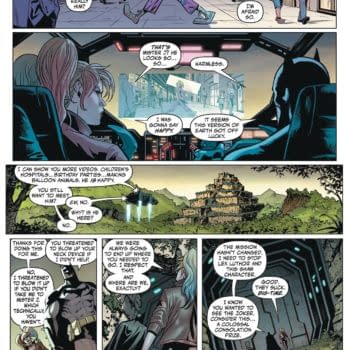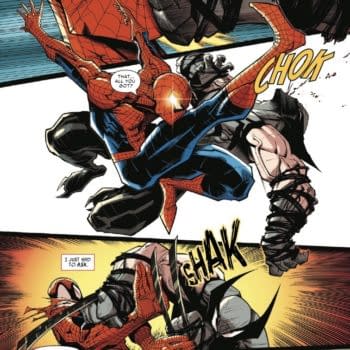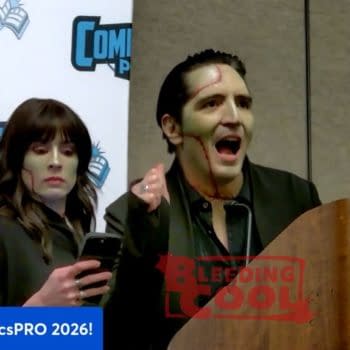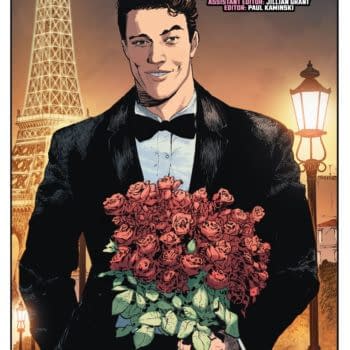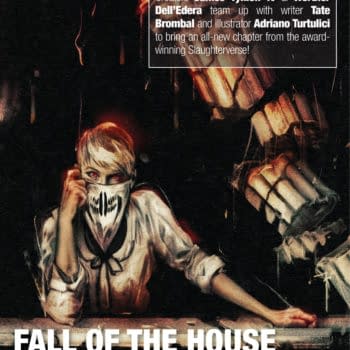Posted in: Comics | Tagged: Comics, david liss, dynamite, entertainment, Moriarty Lives, sherlock holmes
David Liss Writer's Commentary For Sherlock Holmes: Moriarty Lives #1 And #2
With the recent release of Sherlock Holmes: Moriarty Lives #3, we thought this would be a good time to do a writer's commentary on the first two issues with series writer David Liss. Having built his name writing historical-mystery novels such as the Edgar Award winning A Conspiracy Of Paper, Liss jumped into comics in the last few years having written Black Panther and The Mystery Men for Marvel as well as The Spider and this series for Dynamite Entertainment.
Issue #1
1. One of my main goals in writing this series was to try and divorce myself from any of the versions of Moriarty that exist outside of Arthur Conan Doyle's stories. To that end, I decided that everything we know about Moriarty should come from those stories, and beyond that I was free to extrapolate as I saw fit. Almost from the beginning, I knew the series was going to start with this image — ReichenbachFalls, where Holmes and Moriarty presumably fall to their deaths in "The Final Problem." In the Doyle stories, this is where Moriarty ends, so it seemed like a good place for me to begin.
2. Not to be too heavy-handed, but here were are washing away our conceptions about Moriarty. After all, we don't know much about him from the "The Final Problem" except he's a brilliant strategist and that Holmes considers him a genuine threat. I liked the idea of putting Moriarty in a situation in which he would have a chance to show who he really is at his core. The circumstances of the source material make this easy since we know that his crime network has been dismantled. Moriarty is had no one and nothing.
3. That said, a man who is Holmes's equal is not going to let himself stay down for long. Once ashore, he's already beginning to think about how he can improve his position.
4-5 We are told by Doyle, rather than shown, what makes Moriarty so dangerous. I wanted to suggest that his skills are similar to Holmes – he is a great observer of human nature. This was a fun sequence to write in which we get to see the power of inductive thinking used, not to solve crimes, but to commit them.
6-7 More set up here. Moriarty has improved his position somewhat – he now has dry clothes, but were getting the sense right away that there is something not right about the city where he's washed ashore.
8-10 We're moving into a pretty firmly established genre here, I think – the stranger who comes to town who may not be a nice guy, but brushes up against an even worse situation. A couple of key things I wanted to emphasize, beside how freaked out everyone is about this "Baron," is that Moriarty is very controlled. He walks into the tavern, and when he's insulted, he doesn't get angry. He is extremely precise in his emotions and his behavior. The other is the Johana the barmaid. Moriarty may not look like a typical leading man, but he's got something about him that some women are going to find hard to resist.
11 In many ways, this first issue works a lot like a classic western, with the grizzled hero confronting the local bullies. Moriarty finds out the bad guys want something from Johana, Moriarty is not about to let himself be intimidated. In so many extra-canonical Holmes stories, Moriarty comes across as nothing but pure evil, and I wanted to do something else with him. He's a bad guy, yes, but there's no reason to believe he is completely malevolent.
12-13 I also liked the idea of Moriarty being physically competent. He is also fairly merciless, which I guess is why he's a bad guy.
14 In the aftermath of all that violence, Johana's main concern seems to be for Moriarty's safety. This is meant to show less how awesome he is than how terrifying she finds the Baron.
15. And, finally, we meet the Baron. I love how Daniel Indro renders him, a well-dressed and proper Victorian gentleman, and totally bad ass at the same time.
16. We wanted to keep this story grounded in the real world, so I wanted the reader to be skeptical from the outset about von Hohenheim's claims to be an alchemist. That said, he does seem to have some powers, making him a more mysterious figure.
17. We've already seen that Moriarty is a great fighter, having taken out three of von Hohenheim's enforcers, but the Baron drops Moriarty almost instantly. Then, for good measure, he pisses on him. We've been trained for so long to think of Moriarty as pure evil, that I felt it was necessary to give him a real incentive for revenge. Given that he's already lost everything, I wanted him to really, really hate the Baron. I figure getting peed on would work.
18-19. Johana's death has to be accidental since there is information the Baron is trying to get from her. And with her dying breath she extracts a promise from Moriarty. He may be on the wrong side of the law, but he's still an English gentleman, and he has given his word to a dying woman who was kind to him. Incentive #2!
20. And finally we get to meet Udo, whom Moriarty has promised to look after. I can't think of a worse person to take care of an orphan than Moriarty, which is why I loved the idea of setting this up. You just know this relationship is going to have problems.
Issue #2
1. We open with an image of Moriarty on the run with Udo. Clearly he has decided, however temporarily, to honor his promise to Johana. And here we get a sense of Moriarty's humanity, or at least his conflicted nature.
2-3. With the police after them, Moriarty leads Udo into a nearby house. An unknown situation is always going to be preferable to a known danger.
4-6. Now we are introduced to Karl and Sara. Moriarty demonstrates a couple of things quickly – that he is willing to threaten an infant, and that he is also willing to face pain and injury. He then quickly performs some Holmes-like analysis on Karl's life, and finds his weak spot. By exploiting Karl's fear and ambition, in the space of a couple of minutes, he convinces these strangers to harbor him.
7. It's clear from the outset that Sara is not happy about this new arrangement. Moriarty now wants to know what von Hohenheim is after. I really enjoyed having him say to a boy whose mother has just died, "If you're quite finished grieving." Whatever his intellectual capacity might be, I wanted to show that he is not a terribly empathetic person.
8. In this kind of story, in which a villain is thrust into the role of a hero, you have to make sure you give your main character a sufficient motivation. In the previous issue, I established that Moriarty hates von Hohenheim for besting him, for urinating on him, and for killing someone who was kind to him. Those are all got motivations, but I wanted to make sure there was something more, something tangible, that would keep Moriarty from just throwing up his hands and walking away. Enter greed. Von Hohenheim wants Udo because Udo has the keys to an otherwise unreachable fortune. Moriarty is now properly motivated to take revenge by stealing a bunch of money. The anti-hero is now locked in.
9-10. We now switch to von Hohenheim's mansion. I wanted to play with the idea of him being a mad scientist and a pure villain, the kind of guy who gets a charge out of torturing animals – literally! In part, this was so that Moriarty would seem less bad by comparison, but also because I like to add an element of levity to this kind of story. I figured it would be more fun to write von Hohenheim if he were completely over-the-top.
11. Now we meet Clara, von Hohenhim's young, attractive, and unhappy wife. Hmm. I wonder if this could be leading somewhere…..
12-13. I wanted the relationship between Moriarty and Udo to remain something of a mystery throughout the series. Does Moriarty genuinely want to help the boy, or is he just after the bank notes in the safe? Either way, he needs to make Udo useful, and so we commence his education. Moriarty shows Udo how to read other people and how to anticipate their actions. We get a deeper sense here of how Moriarty, as the anti-Holmes, functions.
14-15. Now we see Moriarty planting beginning to set up the building blocks of his larger plan. The Wolf Pack business will become important, but we don't know how yet. We also get the sense, as Moriarty and Udo talk, that Udo is very clever, and so perhaps worthy of being Moriarty's student.
16-17 Something of a classic training montage as we see how Udo begins to learn to think and fight like Moriarty. The question should be implicit: is Moriarty training an assistant or an adversary?
18. The fun part of this scene was the dialogue between Gustav and von Hohenheim, but we are setting up some important plot points. Gustav is beginning to worry about this new gang, the Wolf Pack – the graffiti that Moriarty has been leaving all over town. Von Hohenheim orders Gustav to hire more thugs, which, we should realize, is exactly what Moriarty intended.
19. And, in case you missed, that Moriarty now explains it to Udo as he puts on his disguise.
20. Having established the need for von Hohenheim to hire more thugs, Moriarty now gets himself hired by the very man who is looking to find him. In disguise, he is about to enter the lair of his enemy. This is exactly the sort of note on which I like to end an issue. I don't like to leave the reading wondering How will they get out of this? because we all know they will get out of it. It seems to me that What is going to happen now? is a much better question with which to leave the reader.





























